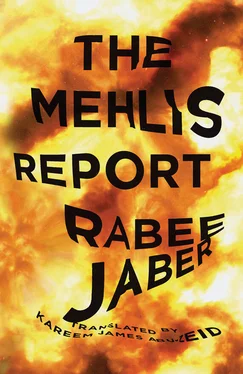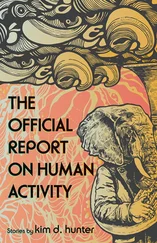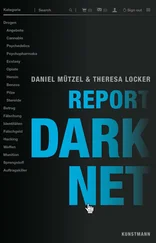Cecilia says she talked to Jihad, the man in charge of the fish department, and that he told her the storeroom became a shelter during the war, and was also used to store weapons during the “War of Elimination” between Michel Aoun and Samir Geagea in 1990. The tunnel in the room beside the elevator links up to another storeroom, which is empty and no longer in use. The police had searched the whole place when the cook (his name was Iskandar) disappeared.
Saman says that when she spoke to him in the morning, he felt as though she were telling him about a nightmare. And he says he hadn’t slept much because he’d taken some medication: he dreamt he was standing in a dark place, and didn’t know where he was. Cecilia laughs. And so does Saman.
He goes to the bathroom, then comes back to the TV. A documentary on Hong Kong. A market that sells dried fish. Shark fins, dry and yellow: people eat them fried. Why doesn’t he ask Cecilia to teach him how to cook? Cooking’s not hard. He watches her do it all the time. He’s never cooked anything in his life. Not even eggs. On the rare occasions he feels like eggs, he only ever boils them. He doesn’t know how to fry one. If he wants fried eggs, he goes to a restaurant. “I’m forty years old, and I still don’t know how to crack an egg into some butter or oil,” Saman Yarid thinks to himself.
His cell phone rings, then falls silent.
An hour of swimming will burn off the manakish . He gets changed, grabs a bag (filled with a towel, a swimsuit, a T-shirt, wallet, phone, and his keys), and leaves the house. He turns off Ghandour al-Saad and onto Rue Huvelin. It’s past three in the afternoon, and the students are coming and going from the restaurants and cafés by the Jesuit University. Rather than pass through the crowds in front of the university, or through the stream of cars leaving the underground parking lot, he turns right and heads onto Ayoub Tabet, a long, calm street. The shadows of the Jesuit stables stretch out on his left. How many times had his grandmother told him about the Jesuit priests in their long robes riding their horses along these dirt roads? The dirt has been covered by asphalt, and nothing remains of the old stone stables except this wall with its high and rusty iron-lattice windows. The place has turned into a parking lot. He steps onto the sidewalk, then steps down again. There’s a red Honda in front of the Citronnier Nursery: a crying child in a white dress jumps into her mother’s arms. He walks by the nursery school and passes under the dry branches of a carob tree (that tree is green in the springtime; and at the beginning of summer he can see its full pods hanging there like green beans).
There’s a nightclub past the carob tree, one he’s only been to a few times. And past the club there’s a small old sawmill out of which the smell of wood is drifting. The sawmill is in a vaulted cellar guarded by a wooden gate from bygone days. Inside, two elderly brothers are working. One of them is wearing an undershirt. Saman turns at the trash bins (men are sprinkling some white calcium powder around them, but the powder turns black and sticks to the asphalt like pitch) and walks on the sidewalk on the other side of the street. Saint Joseph (Jesuit) University Street stretches out before him, but he covers the ground quickly. It never takes long when he decides to walk fast. He used to run long distances in the old days, and play soccer too. But he stopped after his illness in the eighties. He lost contact with the team. Three different doctors treated him. The first was from the Naffa family, and was a close relative of his father’s friend George Naffa. The second was Ilyas Karam. The third was Philippe Gachet, the only one who did him any good. He didn’t treat him in Beirut. He treated him in Lyons, in France. The Shidyaq store is closed now. The place has been up for sale for years, but no one’s taken it. All the electrical boxes on this street have “Matanius” written on them in ink. Was that the name of the bill collector, or what? Maybe they all share a generator. He thinks about the tailor Shidyaq. His father was one of Shidyaq’s customers. He remembers a man in the neighborhood who died, and how the tailor made one last suit for him. They tried the suit on the dead man, but the pants were too long. The sons and daughters of the deceased insisted on the tailor coming and adjusting them while the father was lying in his coffin (Shidyaq hemmed the pants with a needle and thread).
Saman crosses the empty white plaza and takes the road beside the ruins of the City Palace Cinema. He passes behind the Lazariyyah Complex and then behind the “Teatro” Theater, which they haven’t finished restoring yet. He intentionally avoids passing through Amir Bachir Street and the Parliament District. That area is packed right now with friends and acquaintances of his, and he doesn’t want anyone derailing his exercise. He passes behind the car park and enters the street with iron roadblocks set up in front of the UN’s ESCWA building. Remembering he’s carrying a bag, he keeps away from the security men, passes the roadblock, and crosses the intersection in front of the Bladour Hummus, Bean, and Fattah Restaurant. He doesn’t go down the street with all the banks. He turns left toward the small statue of the painter Umar al-Unsi, whose likeness is standing there, painting beneath the acacias and sycamores while birds fly around it: they’d put some wooden birdhouses in the trees. Al-Unsi is facing the road. There are statues of gazelles around him as well. Saman Yarid passes in front of the water fountains beneath the Government Palace and quickens his pace even more. The endorphins are pumping through his veins now. The hormones of happiness. He feels like he’s taking off. His spirits are rising. The memory of last night fades away completely. Cecilia seemed to be feeling better on that last phone call as well. There were gardens beneath him. The smell of jasmine. Young men and women in the shade of the trees. Roman baths and ruins. People taking breaks from work and eating sandwiches. He turns near the Capuchin Franciscan Church. He looks at the church’s small round windows, and at those of the Government Palace. The Wadi Abu Jamil district appears. He recalls what it was like after the war. He used to come here and walk between the wrecked buildings. Emily came with him a few times. She’d bring her camera and jump through the rubble. She only joined him the first few times. They were still afraid of land mines back then. He keeps on walking in a straight line behind the Awdah Bank (the Awdah and Saradar Group): he wants to avoid the sidewalk beside the main road. He doesn’t want to come across anyone who might interrupt his swift progress. The villas are lined up above him in the shade of the Government Palace. He passes between two construction sites and thinks about how strange this city is. All these assassinations and explosions, all this tension, all this fear of falling back into civil war, and yet these buildings keep sprouting up. A whole city is rising up between the Bab Idris district and the ruins of the Saint Georges Hotel. A forest of buildings surrounded by green construction netting: inside the safety netting, workers are rushing around like ants, endlessly welding steel and carrying panes of glass. Machines are molding cement, cranes are hoisting rocks, and dust fills the sky. Endorphins fill his body, and the site of all this construction lifts his spirits. These rising buildings are a good omen, thinks Saman Yarid. Two new high-rises are going up not far from his house. Yarid Architecture did the initial designs. He and his cousin Antoine Khoury prepared the first design sheet. Each apartment is 6,000 square feet. The two towers are located at the intersection of Abd al-Wahab al-Inglizi and al-Doumani Streets, which descends toward Ghandour al-Saad Street. His cousin thought about buying one of the apartments. He changed his mind after Hariri was killed.
Читать дальше












